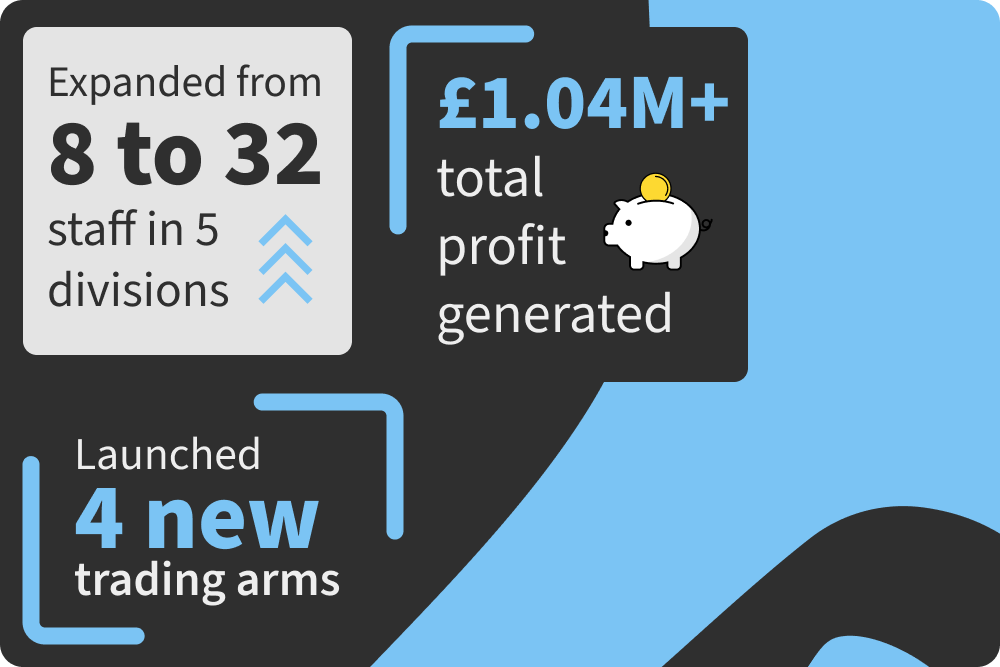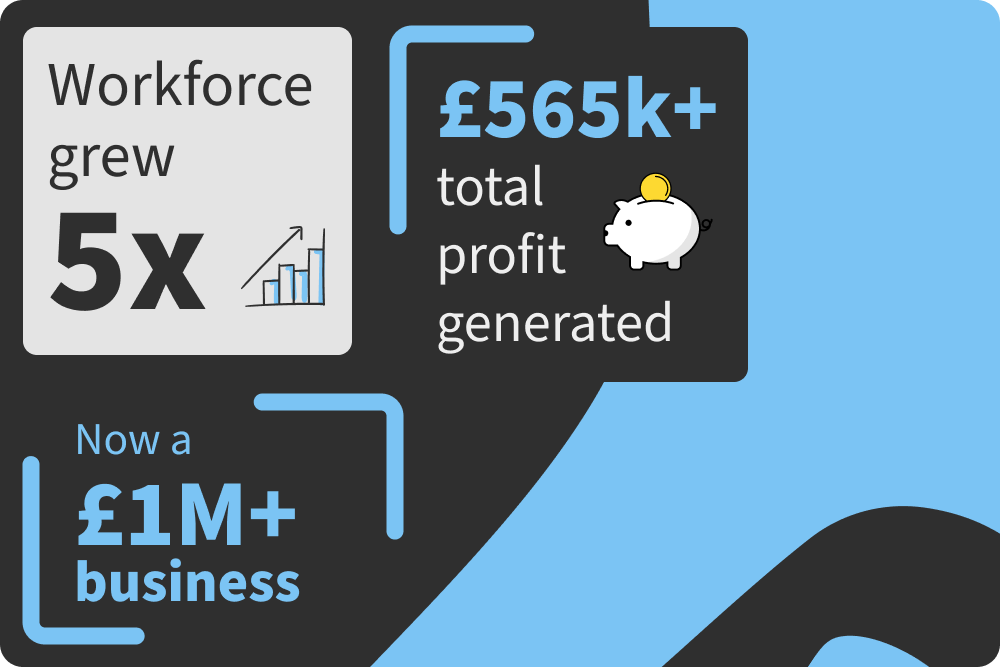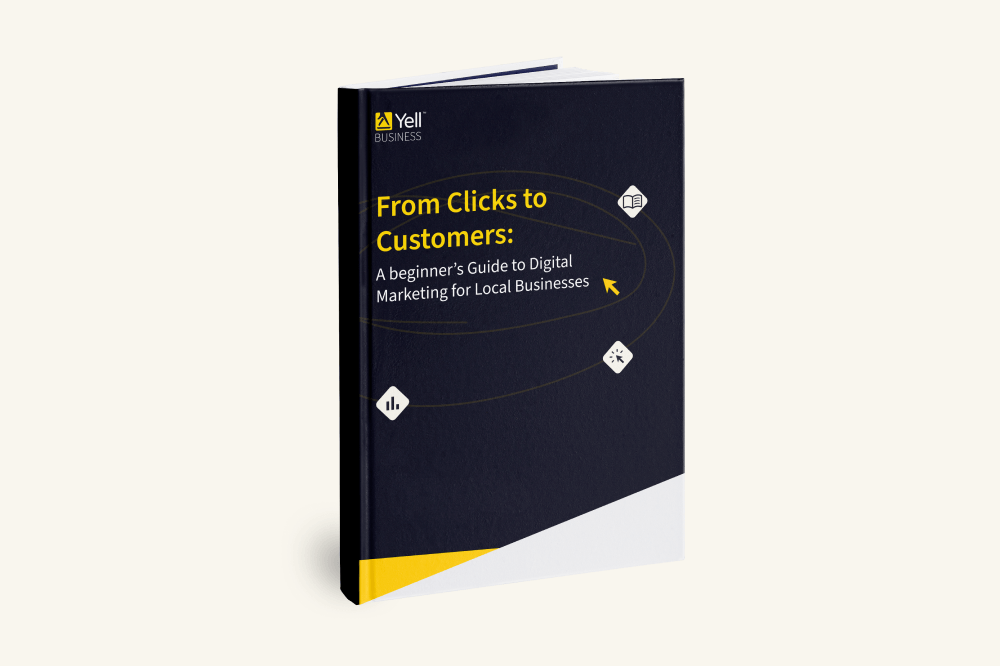A well-designed website is essential for any small business, acting as your digital shop front and a powerful tool for attracting customers. 75% of UK consumers start their search for products and services using search engines, so it’s important that your business website is part of those search results.
According to research by Forbes Advisor UK, 83.5% of small business owners said that their website plays a big part in their business, and 69% of UK business owners who don’t have one think that they should. Whether you work in trades, professional services, or health & beauty – creating a website that looks great and works for your audience doesn’t have to be complicated.
Why does your small business need a website?
Having a website for your small business isn’t just a nice extra – it’s an essential. Think of your website as your business’s always-open shop window. Whether someone wants to book an appointment, read up on what you offer, or message you at midnight, your website is there to make it happen. Plus, it’s a game-changer for marketing. A website helps you get found, build trust and grow your business – without being glued to your phone 24/7.

Step-by-step-guide to creating a small business website
Before you get started, it’s important to understand the steps involved in creating a small business website. We’ll go into more detail throughout the article, but let’s start with the basics to have in mind when it comes to how to make a website for a small business.
Plan your website
Before you start building, take time to map out your website’s purpose and structure, along with your target audience. A clear plan will make the process smoother and make sure that your site meets your business needs – here’s what to think about:
- Define your goals and audience – Are you selling products, showing off your services or looking to provide information for your audience? Your goal will shape the design and content, as will understanding your target audience.
- Choose a domain name – Pick a name that’s simple, memorable and relevant to your business. Think about whether you want to buy the .com or co.uk (or both) and what website domain makes sense for your business.
- Decide on a platform – Website builders like Wix, Squarespace or Shopify (for e-commerce) are great for beginners, while WordPress offers more customisation.
Build and design
Once you have a plan in place, it’s time to bring your website to life. Here’s what you need to know if you’re going to create your website from scratch yourself:
- Choose a template or theme – Most platforms offer pre-made designs that you can customise to fit your brand.
- Add essential pages – Include a homepage, “about” page, services or products page, contact page and any other relevant sections.
- Make it user-friendly – Ensure navigation is clear, text is easy to read and the site works well on mobile devices.
If you’re not comfortable DIY-ing your website, you can always work with a website developer who will create it for you.
Launch and maintain
Once you’re ready to reveal your website to the public, there are some important steps to take to make sure that as well as looking great, it works for visitors too:
- Test everything – Check for broken links, slow loading times and mobile responsiveness before publishing.
- Optimise for SEO – Use relevant keywords your target customers will be searching for, e.g. “electricians in Bolton”, in your titles and content, add meta descriptions and register with Google Search Console to help customers find you.
- Keep it updated – Regularly add fresh content, update product listings and ensure security features are in place.
A detailed guide on how to make a small business website
Now that we’ve looked over the process of creating the website, let’s get into the details on how to make a website for a small business. From understanding which website builder is best for small business, to the average cost of website design for small business and understanding small business website design, here’s a closer look at what you need to know.
Plan your website
We’ve talked about the importance of understanding your goals, your audience and the services or products you offer – now it’s time to consider any particular features you might need too. A tradesperson might need a contact form for enquiries, while a hairdresser might benefit from a booking system, or a boutique might want to have an ecommerce platform.
Think about the structure of your website. Most small business websites include a homepage, an ‘About’ page, a services or products page, a contact page, testimonials and sometimes a blog. Check out the essential elements of a small business website for more information on how to structure your website.
Choose the best website builder for small business
Website builders offer an accessible way to set up your website without needing lots of specialist technical skills. They make it easy to create a website without having to learn code, and can be quicker and more cost-effective.
But with so many options out there, how do you choose the right one? Here’s a quick breakdown:
- Wix – Easy to use with drag-and-drop editing. Great for small service-based businesses.
- Squarespace – Sleek, modern templates that work well for creative and professional businesses.
- WordPress – More flexible and customisable but has a steeper learning curve.
- Shopify – The best choice if you’re selling products online.
For most small businesses, Wix or Squarespace are solid options, as they include hosting, templates and support in one package.
How much does it cost to make a website for a small business?
The cost of building a website varies depending on the platform, features and level of customisation. A domain name costs between £10 and £20 per year, while hosting can range from £5 to £30 per month. Many website builders require a monthly subscription, which can cost anywhere from £10 to £50 depending on the platform and features.
Some platforms, such as Wix and Squarespace, bundle hosting, domain registration and website security into their pricing plans, making it an easier, all-in-one solution.
If you choose to hire a web designer, the cost can vary depending on what you need and the designer. It can be anywhere from £500 to thousands of pounds. You also need to think about additional costs like professional email hosting, security certificates (SSL) and potential marketing expenses like SEO or paid advertising.
Designing your website effectively
A well-designed website should be easy to navigate and drive potential customers to action, whether that’s to make an appointment, call or purchase. It’s best to keep the design clean but on brand for your business.
You also need to make sure that your website is mobile-responsive and loads quickly – slow websites can drive customers away. Calls to action should be clear, and you can build trust by including testimonials, reviews and case studies . Find out more about web design in our blog: how can web design packages benefit small businesses.

Optimise your website for SEO and performance
Most people use search engines to find out information, and optimising your website for these searches is an important part of being found by your audience. You want it to rank well on Google and show up in search results.
Setting up a Google Business Profile is important – especially if you have a physical business you want customers to go to – and keeping your website updated regularly can also help with search engine optimisation (SEO).
To improve how your website shows up in search rankings:
- Use relevant keywords in your page titles and descriptions
- Write helpful content that answers common customer questions
- Make sure your website loads quickly
- Use meta descriptions and titles across your website to help search engines find you
- Make sure your website is secure
Launch and promote your website
Once your website is ready, it’s time to launch it. Test it fully before it goes live – that means making sure links and booking forms are working, that pages show up properly, that contact details are correct. Don’t leave any stone unturned.
Once you’re live, social media is a great way to share your website, as is email marketing and making sure your website address shows on all of your marketing material. List your website on online directories like Yell or any industry-specific platforms, and think about social media advertising too.
Get started with your website
If you need support to build your website, we offer conversion focused website design that takes the tricky parts out of your hands. To begin, book a free 30-minute audit and advice session to discuss your business needs with one of our friendly experts.
We’ve already helped over 150,000 local businesses get online, and we’d love to help you too. Find out more about website design with Yell. Get in touch about our website design today.
Want more tips, tools and tricks to support to use digital marketing in your business? Download our Digital Marketing Guide.







